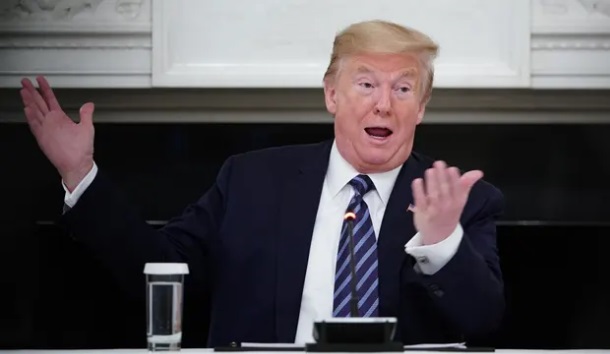President Trump signed an executive order today aimed at limiting the broad legal protections enjoyed by social media companies, two days after he tore into Twitter for fact-checking two of his tweets.
“We’re here today to defend free speech from one of the gravest dangers it has faced in American history, frankly,” Trump said from the Oval Office. “A small handful of powerful social media monopolies control the vast portion of all private and public communications in the United States.”
Trump said the tech companies have “unchecked power to censor, restrict, edit, shape, hide, alter” a large sphere of human interaction. “They have points of view,” he said.
The Trump administration hopes the order will eventually set the stage for new regulations on tech platforms such as Twitter and Facebook.
Industry groups roundly criticized the order.
But legal experts said they were doubtful the move would have any practical effect on the tech giants.
Legal observers described the action as “political theater,” arguing that the order does not change existing federal law and will have no bearing on federal courts.
Trump’s latest confrontation with Twitter was set off after the tech company placed fact-checking warnings on two of his tweets that claimed, without evidence, that casting ballots by mail allows for voter fraud. Both Democratic and Republican states have used voting by mail for years without reports of widespread fraud.
Trump lashed out at Twitter, comparing the fact-checking labels to censorship and accusing the social media giant of stifling conservative voices, though the president did not provide any examples to back up his assertion.
Trump, who often uses Twitter as a megaphone to tout his victories and blast his critics, responded to the fact-checking labels by threatening to shut down social media companies despite not having the sole authority to do so.
Twitter CEO Jack Dorsey said Wednesday that the platform will continue to warn users about factual distortions on it.
“This does not make us an ‘arbiter of truth,’ ” Dorsey wrote on Twitter. “Our intention is to connect the dots of conflicting statements and show the information in dispute so people can judge for themselves. More transparency from us is critical so folks can clearly see the why behind our actions.”
Dorsey’s comment was an apparent response to Facebook CEO Mark Zuckerberg, who told Fox News earlier Wednesday that social media companies should stay out of the business of weighing in on what is true or not.
“Private companies probably shouldn’t be, especially these platform companies, shouldn’t be in the position of doing that,” Zuckerberg said.
Gary Shapiro, president and CEO of the Consumer Technology Association, which represents over 2,000 tech companies including Facebook and Google, called Trump’s move “unconstitutional” and “ill-considered.”
“The free speech protections in Section 230 of the Communications Decency Act are the legal underpinning of our vibrant U.S. online economy and our nation’s global digital leadership. America’s internet companies lead the world and it is incredible that our own political leaders would seek to censor them for political purposes,” he said in a statement.
Even the U.S. Chamber of Commerce, which is typically aligned with Republicans, issued a statement sharply criticizing the president’s order.
“We believe that free speech and the right to engage in commerce are foundational to the American free enterprise system. Regardless of the circumstances that led up to this, this is not how public policy is made in the United States. An executive order cannot be properly used to change federal law,” the Chamber said.
The White House order takes aim at a 1996 law passed by Congress that has often been at the center of political fights over regulating speech on social media platforms: Section 230 of the Communications Decency Act.
The law protects Internet companies from being sued over content that appears on their platforms and allows for content moderation.
The removal of a post is left up to the internal rules of companies such as Twitter and Facebook, provided those decisions are made “in good faith.”
Courts have repeatedly upheld the law in favor of technology companies, even when the statute was used to defend websites advertising children who were forced into sex trafficking.
Trump’s order seeks to chip away at that protection by offering a new interpretation of the law. The order argues, in essence, that if the social media companies restrict certain voices on their platforms, the companies should be stripped of their legal immunity, opening the doors to a wave of lawsuits over content seen as defamatory.
Legal experts greeted the order with heavy skepticism, saying, absent a new law passed by Congress, it would not be legally binding.
“It flies in the face of 25 years of judicial precedent, that has been federal precedent in almost every circuit court,” said Kate Klonick, a professor at St. John’s University School of Law in New York. “It’s not the role of the president to interpret federal law.”
The order was “a very, very clear piece of political theater,” said Klonick, adding that the action is “unlikely to have any kind of weight or authority.”
